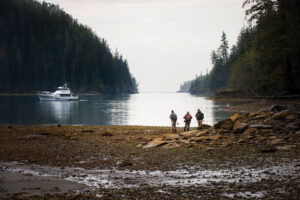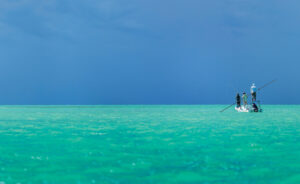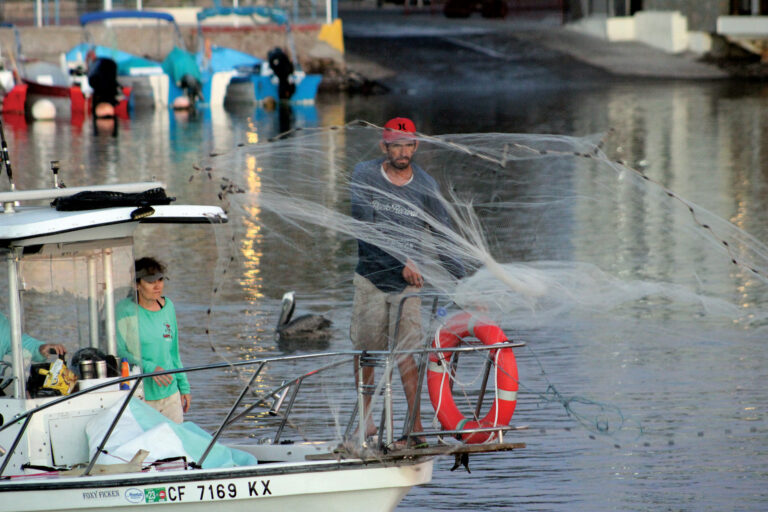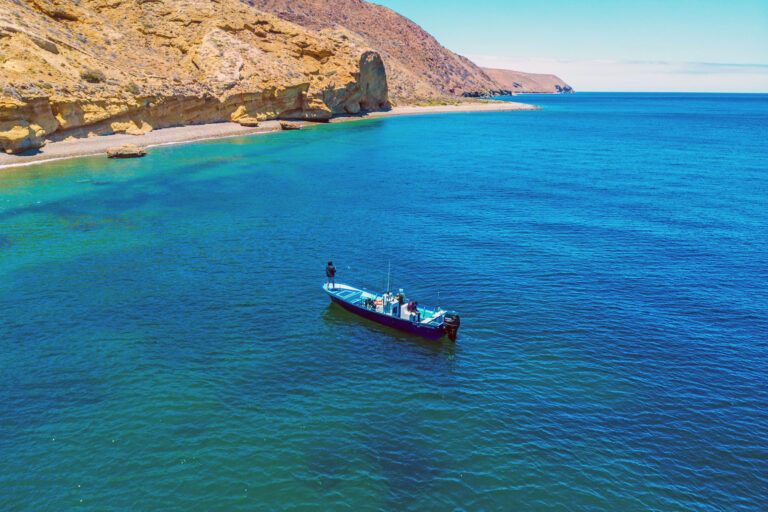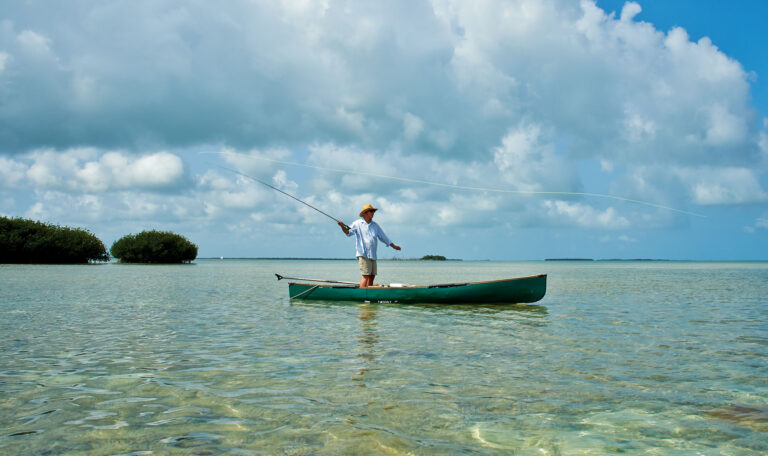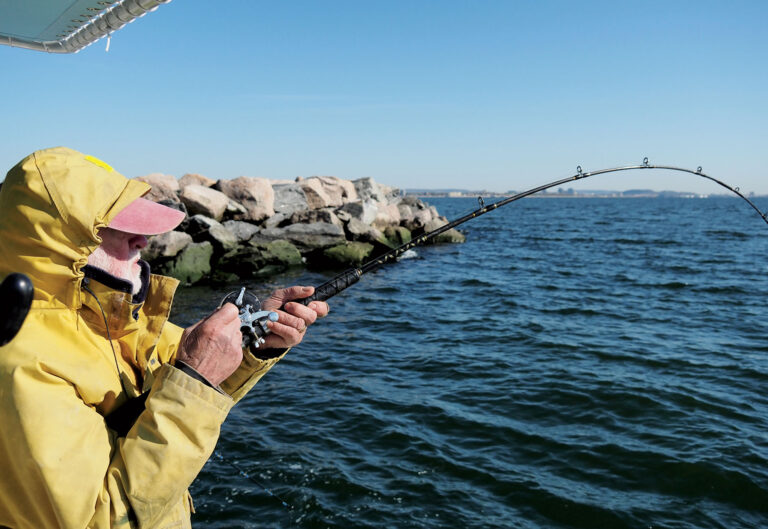Photos by Charlie Levine
Women are better anglers.
I’ve heard that claim a lot over the years, and it’s typically followed by a secondary claim that women are better anglers because they are also better listeners. I certainly don’t doubt either of those claims, but I do think there is a caveat: Women are better listeners so long as the person doing the talking is not a spouse or partner. I might be making a dangerous generalization here, but let me provide an anecdote to back up my assertion.
About 15 years ago, I took my girlfriend (who is now my wife) on her first offshore fishing trip. We were in Isla Mujeres, off Cancun, Mexico, and fishing for sailfish with a longtime buddy, Capt. Anthony Mendillo. My wife had never been on a big sportfishing boat, but she found the cabin cozier than the cockpit and was happier reading a book than watching the lines. We were trolling ballyhoo rigged with circle hooks, and yes, it can be a tad boring when the bite is slow.
After a dull morning, the fish began to chew. Really chew. We found massive bait balls surrounded by hungry sailfish. Frigate birds circled and picked off sardines. Sails zipped and jived at the surface. The scene was frenetic. You couldn’t help but get excited. Each time we trolled past the action, we’d get at least one bite and often multiple.
 The author learned a valuable lesson when taking his then-girlfriend (now wife) offshore for her first time to chase sailfish: Women do make better anglers when they have a patient coach.
The author learned a valuable lesson when taking his then-girlfriend (now wife) offshore for her first time to chase sailfish: Women do make better anglers when they have a patient coach.My wife, who’d held a conventional, lever-drag reel only a couple of times, had no idea what to do. I’d given her a quick tutorial on the ride out to the grounds, explaining how to hold the rod, feed out line in free spool and engage the drag, but it didn’t stick. I was excited by the action and began to raise my voice, barking orders at her, when she missed the first few fish and wound up with a bird’s nest in the reel. That’s when Capt. Arch Bracher stepped in. Arch is a well-respected captain from North Carolina who was fun-fishing with us. He changed the dynamic immediately.
“Charlie, you go stand over there,” he told me, pointing to the opposite corner of the cockpit. “Let me show Diane how it’s done.” I was more than happy to oblige.
Arch spoke to her in a calm tone and coached her on the process of dropping back for five or so seconds before engaging the drag to hook the fish that just pulled the bait out of the rigger clip. Diane not only got the hang of it, but she managed a better hookup percentage than I did. She caught so many fish that she said she had a case of “sailfish elbow,” which was cured with a few ice-cold Pacificos back at the dock. We counted more than a dozen releases that day, and I credit Arch and his cool demeanor for our success. Yes, women are good listeners, especially when the message is delivered by a good coach. Lesson learned.
I couldn’t help but think of that day offshore with my wife as I pulled into Key West with my 8-year-old son Max earlier this summer. We were meeting Hunter Ledbetter, another longtime friend who is a photographer, diver and retired U.S. Marine Corps colonel. Hunter did multiple tours in Iraq and Afghanistan, but these days he spends most of his time fishing and diving.
The plan was to head offshore, troll for mahi-mahi and then drop baits on a few bits of structure to put mutton snapper on deck. Max had never been offshore, and we’d already shuffled the dates around because of an east wind that had been blowing for weeks. We were in the Florida Keys for our summer vacation, and while we caught tons of mangrove snappers and small barracudas around the docks by our rental, we had yet to score a trophy catch.
 When offshore fishing didn’t pan out, bottom fishing in the lee of Key West provided steady action and plenty of life lessons.
When offshore fishing didn’t pan out, bottom fishing in the lee of Key West provided steady action and plenty of life lessons.Max was as wound up as a cat toy when we met up with Hunter and jumped aboard his 28-foot SeaHunter center console. He could hardly contain himself, asking questions in rapid-fire, playing with the baits in the live well and smiling ear-to-ear.
Those smiles, however, were nowhere to be found as we made our way offshore in a 4-foot head sea. After an 8-mile slog, we got to our spot and attempted to set the anchor. Once we got the boat situated over the structure, we dropped some baits. I hooked up first, but a 4-foot barracuda bit me off, then parked itself under the boat. Max got seasick and started to cry, hiding his face in his hat. Not exactly the introduction to offshore action I’d hoped for.
We decided to change course. Hunter ran us back toward Key West and out into the Gulf, where we’d be in the lee of the wind. The seas flattened, the smiles returned, and before long we were on a productive piece of bottom in about 40 feet of water. When Max hooked a nice yellowtail snapper, I stayed out of the way, remembering what I had learned with my wife so many years back, and let Hunter do the coaching. But Hunter’s delivery was a tad different than Arch’s. Hunter went into Marine Corps mode, but in a nice way (no cussing).
When Max lucked into a beast of a mutton snapper on a small jig intended for a yellowtail, he struggled to gain line. He wanted to keep the rod butt under his arm, but when you’re only 4 feet tall, you have very little leverage to pump the rod. Hunter instructed Max to hold the rod at his waist, and he stuck a Cush-It protector on the rod butt for comfort. Max tried it but kept sliding the rod under his arm.
 The author’s son with a nice mutton snapper, ready for the table.
The author’s son with a nice mutton snapper, ready for the table. “It’s too big,” Max said. “I can’t do it.”
“Don’t say that,” Hunter retorted. “You got this. But it’s going to be a lot easier if you listen to me and put the rod in your waist.”
“It’s too hard.”
“You are stronger than that fish, but you have to use the leverage of the rod so you can pump it and pull on the fish,” Hunter said in a firm but nurturing way.
Max listened. He gained line. We got the fish. I was proud.
“OK, now let’s hold him for a picture,” Hunter said. The fish slapped its tail and scared the hell out of Max, and he dropped the fish on deck.
“I can’t do it,” my boy said.
Hunter looked at me, and I cracked a smile. “Yes, you can,” Hunter said. “Yes, you can.”



